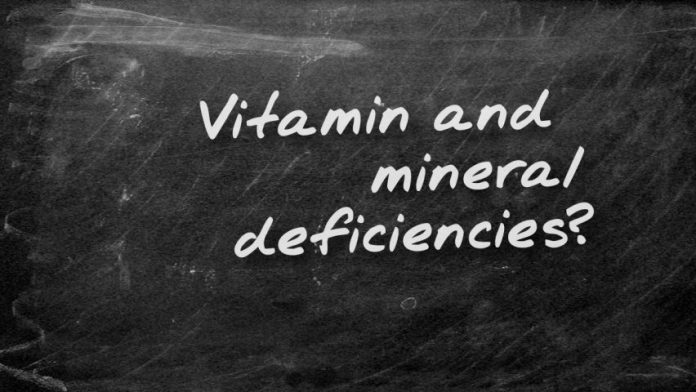According to UNICEF’s Global Damage Assessment Report, one-third of the world’s population suffer from vitamins and minerals deficiencies leading to debilitating bodies, minds, energies, and economic prospects of nations. In fact, UNICEF’s Executive Director, Carol Bellamy, warned that:
“It is no longer a question of treating severe deficiency in individuals. It is a question of reaching out to whole populations to protect them against the devastating consequences of even moderate forms of vitamin and mineral deficiency.”
What the above means for the world is the impairment of millions of growing young minds and dangerous reduction in national IQs.
If you thought vitamin and mineral deficiencies were a thing of the past, think again. Here are some statistics that you may be very shocked to learn:
- * Over 250,000 children are born annually with birth defects associated with vitamin and mineral deficiencies.
- * More than 50,000 women die every year during childbirth due to a deficiency of some sort.
- * It’s estimated that 10-15% of people over 60 years of age don’t get enough vitamin B12, which raises their risk of heart disease, makes them bleed easily and causes difficulty walking.
- * 40-60% of children ages 6-24 months in developing countries don’t get enough iron, which impairs them mentally.
- * Approximately 1 million children under the age of 5 die every year because they don’t have enough vitamin A in their system.
Surprised? A lot of people are.
It’s easy to believe that deficiencies were something that happened long ago when food wasn’t as prevalent as it is now. People would have only what they harvested or hunted right then. They didn’t have the ability to process foods and make them last as we can today. That often meant that their diets didn’t contain a wide variety of food so certain vitamins and minerals would, of course, be missing. But, today there’s food on almost every corner, so how is it that we’re deficient in anything?
Well, deficiencies go beyond just the foods you eat. There are certain behaviors or conditions that can put you at risk for not absorbing enough vitamins and minerals. Here are just a few:
- If you smoke, you have a higher risk of developing a vitamin C deficiency.
- If you are pregnant and not taking prenatal vitamins, you have an increased risk of a folate deficiency.
- If you’re an alcoholic or drink a lot regularly, you risk being deficient in folate, vitamin C and vitamin A.
- If you take anti-seizure medications or are being treated for cancer, you may not have enough folate.
- If you have a disease related to your intestinal tractor take a lot of antacids, you have a higher likelihood of being deficient in vitamin B12.
- And, if you take medications for type 2 diabetes or have an autoimmune disorder, you may also lack the necessary amount of vitamin B12.
The list goes on and on. Some people even develop deficiencies in the name of health! For example, some diets promote excessively limiting or even eliminating whole groups of food to help you lose weight. The cabbage soup diet is one of them.
That’s where you can eat nothing but cabbage soup all day, every day. While most people aren’t on those types of eating plans for any length of time, if it’s a way of eating you consistently go back to, you may be increasing your odds of developing a deficiency.
Probably one of the most common ways of eating that eliminates certain food groups is vegetarianism. In the name of health, spiritual belief or animal rights, vegetarians vow to not eat certain things.
There are several diverse types of vegetarians. For instance, a vegan is someone who doesn’t eat any kind of food that used animal products as an ingredient or even in the processing phase. They don’t eat eggs, dairy or honey.
If someone is a lacto-ovo-vegetarian, that means that they don’t eat meat or shellfish, but they do eat eggs and dairy; that’s the general vegetarianism. Pescatarians don’t eat meat like lamb or pork, but they will eat fish.
While each form of eating has certain health benefits, they also have higher risks of deficiencies because they’re cutting out categories of food that are high in vitamins and minerals.
Red meat has a high amount of iron, zinc and riboflavin. So, if you remove these foods from your diet, you risk not getting enough of these important minerals in your body. Milk and dairy products are extremely high in calcium and vitamin D. Cut those out, and you must find other ways for your body to get it.
The point is that you could be doing things that are putting you at risk and not even realize it. And, if you think that because you’re taking a multivitamin you aren’t at risk, you’re sadly mistaken.
Unfortunately, your body doesn’t always process the multivitamins well enough to get everything out of them and use it. For example, if you take them on an empty stomach, your body will absorb fewer of the great vitamins and minerals they contain than if you take it with orange juice.
Some people purchase multivitamins that have over 100% of the recommended daily allowance (RDA) so that they don’t develop deficiencies, but that doesn’t always work either. For example, vitamins B and C are both water-soluble. That means that they may just be excreted from your body before it’s able to use them.
Vitamins A, D, E and K are fat-soluble. So, if you get too much of them, your body will hold onto them. The good news is that you won’t get a deficiency, but the bad news is that you risk taking them to toxic levels, which is a whole different concern! So, knowing all of this, could you be deficient in some necessary vitamins and minerals?












